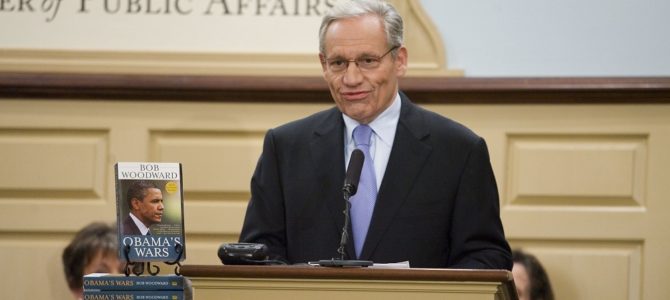
After observing celebrity author Bob Woodward in action on one of his books—a biography of the late John Belushi—the famed director Penny Marshall was unimpressed. The well-known leftist activist reportedly remarked that Woodward’s account was so slanted and inaccurate, “It makes you think that Richard Nixon may be innocent.”
The point, as many other of Woodward’s supposed sources have learned over the years, is that the Watergate reporter’s version of the truth serves his agenda, not an unbiased reporting of the facts.
Woodward has another “tell-all” book due out on Donald Trump this month. Just like the one he published only a year ago, it will have anecdotes and “shocking” revelations tailored to reflect his agenda and the conventional wisdom of the moment. This is why Harper’s magazine, hardly a right-wing rag, labeled him a “political weathervane.”
I know nothing about events inside the Trump administration that Woodward is claiming in his new book, but am sure his version will be repeated without scrutiny across multiple media outlets. That said, I do know something about events that are the foundation for his subsequent fame and fortune. It wasn’t just that Woodward loathed Richard Nixon, it was that he committed journalistic malpractice in his drive to bring him down through Watergate.
First among the instances of his disregard for journalistic ethics is his 30-year refusal to identify the person he claimed as his primary Watergate source, the infamous “Deep Throat,” on whom most of his insider stories were allegedly based.
What Americans did not know at the time is that Deep Throat was a literary invention from the outset. The Deep Throat reference was not in Woodward’s original manuscript of his Nixon-era memoir, nor was that name used in the course of any actual reporting.
Alice Mayhew, Woodward’s Simon and Schuster editor, urged the inclusion of such a nicknamed character to spice up their narrative. Even Washington Post executive editor Ben Bradlee doubted the accuracy of Woodward’s new character, and many still believe Deep Throat was a composite.
For 30 years—until 2005—speculation over Deep Throat’s true identity was a favorite topic of cocktail conversation. One “fact,” however, was made perfectly clear by Woodward: Deep Throat was a disillusioned member of Nixon’s White House staff, so disgusted with its supposed criminality that he leaked helpful stories to Woodward.
It turns out none of that was true, despite what Woodward wanted us to believe. In 2005, former FBI Associate Director Mark Felt, a man who never worked in the White House let alone was close to Nixon, came out as Deep Throat, although at that point Felt was too senile to confirm any details.
Later, Max Holland’s 2012 book, “Leak, Why Mark Felt Became Deep Throat,” described why Felt had leaked information to Woodward: not to destroy President Nixon (whom he supported), but to show that Acting FBI Director Patrick Gray was unable to control the Bureau.
In other words, if he was only Felt, Deep Throat had an agenda: not to “get” Nixon but to hurt his superior at the FBI so he could have his job. A fair and impartial reporter, as Woodward so self-righteously claims to be, would have informed readers that his principal source had these sorts of biases and motivations.
Woodward knew these facts for three decades, yet he knowingly allowed the false impression that he had created to persist. He need not have identified Felt by name, but deliberately encouraging the American public to believe his source was an aggrieved Nixon staffer was a fraud of immense proportions.
Another outright distortion in “All the President’s Men” was the story of “Z,” supposedly a Nixon campaign committee secretary, secretly sharing insider stories with Woodward. “Z” was actually a Watergate grand juror whom Woodward had improperly contacted and was revealing information about pending investigations. Again, Americans were misinformed as to the propriety of Woodward’s actions and to the identity of a key source and blind to that person’s motivations.
Woodward’s contemporaneous notes reveal he should also have been aware of Watergate Special Prosecutor Leon Jaworski’s series of secret meetings with trial judge John Sirica. Knowledge of such collusion between judge and prosecutor would have invalidated virtually all Watergate convictions since under the law Nixon’s defense team should have been party to all such conversations.
Jaworski certainly hinted at this, but it didn’t fit Woodward’s agenda, so he never followed up on Jaworski’s comments. It was not until 2013 that I discovered and disclosed records of those highly improper meetings.
One journalist who worked for Woodward went public with his concerns about his mentor’s journalistic malpractices. Jeff Himmelman, who worked for both Woodward and Bradlee, uncovered embarrassing Watergate files that Woodward wanted him to overlook. Woodward subsequently waged a campaign to discredit Himmelman.
Throughout his career, Woodward has been repeatedly accused of “tilting the facts,” of “misleading remarks,” of “disingenuous statements,” and of placing “book sales above journalism.” Woodward’s decades-long approach to reporting, beginning with Deep Throat, is never to identify to the public his supposedly unassailable sources.
This secrecy allows him to make sensational claims that can’t be fact-checked, concerning sources whose true motivations can’t be examined. It also allows him to have a series of too-good-to-be-true anecdotes that conveniently fit his storylines.
We can expect at least a week of breathless media coverage at the anonymously-sourced “revelations” from “Rage.” Even if most of Woodward’s colleagues in the media will continue unquestioningly carry his water, the rest of us at least ought to at least remember his decades-long track record of putting his personal brand—and book sales—before the truth.









